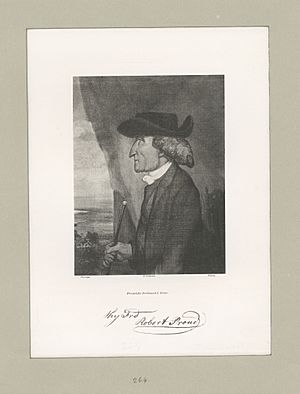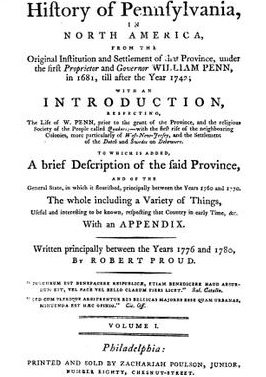Robert Proud facts for kids
Quick facts for kids
Robert Proud
|
|
|---|---|
 |
|
| Born | May 10, 1728 |
| Died | July 7, 1813 |
| Occupation | Quaker educator and historian of the Province of Pennsylvania |
| Parent(s) | William and Ann Proud |
Robert Proud (born 1728, died 1813) was an English teacher, a member of the Quakers, and a historian. He is famous for his writings about the Province of Pennsylvania, which was an early American colony.
People sometimes call Robert Proud "Pennsylvania's first historian." He was a Loyalist during the American Revolution. This means he supported England during the war. He wrote many of his books while living in poverty after moving from England to Philadelphia.
Contents
Early Life and Education
Robert Proud was born on May 10, 1728, in Yorkshire, England. His parents, Ann and William Proud, were farmers. He grew up near a town called Thirsk.
He went to a local primary school. When he was 18, his parents sent him to a Quaker boarding school in Skipton. There, he studied classic subjects like Latin and Greek.
After finishing school in 1750, he worked briefly as a bookkeeper in London. Later, a doctor named Dr. John Fothergill encouraged him to study botany (plants) and pharmacopoeia (making medicines). To support himself, he worked as a tutor for several families. He lived with one family, the Bevans, for many years before moving from England in 1758.
Life in Pennsylvania
Soon after arriving in the Province of Pennsylvania, Robert Proud settled in Philadelphia. He opened a private school for boys where he taught Latin. This school closed after two years.
In September 1761, he got a job teaching at The Friends School in Philadelphia. This school is now known as the Friends Select School. He eventually became a master teacher there. In 1768, he was chosen to join the American Philosophical Society, a group for important thinkers.
Even with his success as a teacher, Proud's life was not easy. For his first 20 years in Philadelphia, he lived in many different Quaker homes. He relied on his Quaker friends for a place to stay and food.
Challenges During the Revolution
During the American Revolution, Proud faced problems because he was a Loyalist. He supported England, which was not popular in America. He was also a pacifist Quaker, meaning he believed in peace and not fighting.
He tried to start a business with his brother in London in 1770, but it failed. At first, he tried to be neutral about the "American cause." But after some protests by those who supported American independence, he went back to his Loyalist views.
Philadelphia became a dangerous place for Loyalists. So, Proud quit his teaching job in 1775. He stayed hidden until 1780 to avoid being arrested. During this time, he wrote poems and translated Latin books. He also did a lot of research for his two-volume book, The History of Pennsylvania in North America.
Return to Teaching and Writing
Around 1788, Proud came out of hiding and returned to teaching at the Friends School. That same year, he wrote about his ideas on education. He believed that teaching young people should help them pay attention and behave well. He also felt that education was a "Religious Duty" that led to "Virtue & Happiness."
In 1793, he stopped teaching again. He wanted to focus on getting his book, The History of Pennsylvania in North America, printed and sold. In 1797, he released the first volume. This book included a short story about William Penn and the religious history of Pennsylvania from 1681 to 1709.
He asked his students and other Quakers in Philadelphia for money to continue his research. With their help, he released the second volume the next year. Volume II covered the years 1709 to 1742 and 1760 to 1770.
However, Proud's history books were not very successful. The Historical Society of Pennsylvania says they were "unsuccessful" because of his Loyalist views and some mistakes.
Later Life and Legacy
Robert Proud struggled with money his whole life. He never married. He died in Philadelphia on July 7, 1813.
Even after his death, Proud's book, The History of Pennsylvania in North America, has been criticized. Some historians say he did not use all the information available. They also say his work showed his strong personal opinions.
Robert Bray Wingate, a former librarian, said that Proud ignored some historical facts. He also noted that Proud was a "Tory," meaning he strongly supported the British king. Proud was upset by the changes that came with American independence.
However, Wingate also said that Proud's writings are still interesting and valuable for historians. They show the views of someone who disagreed with the new American republic.
Publications
Here are some of Robert Proud's published works:
- Proud, Robert. ''The History of Pennsylvania in North America from the Original Institution and Settlement of That Province Under the First Proprietor and Governor William Penn, in 1681, till after the Year 1742, Vol. I. Philadelphia, Pennsylvania: Zachariah Poulson, Jr., 1797.
- Proud, Robert. The History of Pennsylvania in North America from the Original Institution and Settlement of That Province Under the First Proprietor and Governor William Penn, in 1681, till after the Year 1742, Vol. II. Philadelphia, Pennsylvania: Zachariah Poulson, Jr., 1798.
 | Bessie Coleman |
 | Spann Watson |
 | Jill E. Brown |
 | Sherman W. White |


